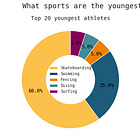Visualizing Data from the 2024 Paris Olympics — Part 2
Medals, medals, medals 🏅
Now that the Paris 2024 Olympics are over, I wanted to analyze data about the medals from the games.
I had a few questions I wanted to answer — such as, which country won the most medals if you don’t look at total medal count, but the percentage of medals won relative to how many athletes were sent? Were some sports dominated by certain countries? And how diverse are the winners for different sports?
This is part two of my recent data visualizations of the 2024 Paris Olympics, where I looked more at the participating athletes and countries. As before, the data is sourced from Kaggle.
A closer look into medal count
Team USA left the Olympics with the highest overall number of medals, at 126 medals. China came in second, with a total of 91 medals.
But, wouldn’t it make sense that Team USA has the highest number of medals, since they sent the most athletes to the Olympics, more than any other country? (Team USA sent 638 athletes; China sent 399).
It might seem obvious, but here’s data to back it up: the more athletes a country sends to the Olympics, the more medals they win (sort of).
Let’s break it down a little.
It might be more informative to look at the relative medal count, rather than the absolute count. I calculated the percent of athletes who won medals (the number of medals won by a country divided by the number of athletes sent by that country).
USA’s overall medal count does not seem quite as staggering in the context of the sheer number of athletes they sent. Around 20% of USA athletes won medals — which is still impressive, but it becomes more comparable with China: 22.6% of Chinese athletes returned with a medal.
Some countries received very few medals — absolutely and relatively. For example, Egypt only won 3 medals, despite sending 156 athletes, or 1.9% of their athletes.
Other countries, such as North Korea and Kyrgyzstan, sent relatively few athletes (less than 20), but a high percentage of those athletes (over 30%) won a medal.
Merely sending a large number of athletes to the Olympics does not necessarily guarantee winning more medals.
Teams vs Individual sports
Countries that send more athletes participate in more team sports, so one might argue that the above figures aren’t fair (e.g. an Olympic volleyball team consists of 12 players, but a winning team would obtain only a single medal).
However, similar patterns as above hold when looking at medal counts only for individual sports. Individual sports are those labeled by the International Olympic Committee as such.
In fact, athletes from the United States won 19.7% of all medals, while this number went down to 17.3% of individual sports.
France sweeps BMX racing and Korea dominates archery
Some countries seem to be better at certain sports.
I determined countries that dominated a particular sport by first calculating the percent of medals won by each participating country in a sport, and then finding the countries that won medals with the highest percentage.
France dominated BMX racing, winning half of the medals. South Korea dominated archery (46.7% of medals) and China dominated diving, table tennis, and badminton.
I also calculated the same metrics for a subset of the sports divided by gender.
Just because a country is good at one sport for male/female athletes doesn’t mean it’s good at it for the other gender. France’s dominance in BMX racing was mainly for the men’s division. On the other hand, South Korea dominated archery for both genders, and China dominated table tennis for both genders (but more so for women’s!).
Boxing and 3x3 Basketball are the most diverse sports
There are many ways to measure "diversity," but here I measure it in terms of how many countries won medals in a sport (proportional to how many athletes that country sent).
This approach allows me to see if medals are distributed among only a few countries or among a more diverse range of participants.
According to this metric, boxing and 3x3 basketball were the most "diverse" — nearly half of participating countries left with at least one medal.
This is in contrast to sports like road cycling, table tennis, and swimming, in which only 10% of participating countries won medals. The reasons for this disparity could vary widely, which I won't explore too deeply in this article, but they might include factors such as cost of equipment, availability of top coaches, and overall popularity of the sport.
I don't want to make any judgments about fairness or equality, but I partly wonder if the sports where a more diverse group of countries win medals are more aligned with the Olympic spirit of international competition (as opposed to single-country dominance).
A case study: is swimming the least diverse sport?
Swimming is the second most popular Olympic sport, with 853 participating athletes and 189 participating countries.
And yet, of these 189 countries, 19 countries won medals, meaning that only about 10% of countries walked (swam?) away with medals.
I don’t know much about swimming as a sport, but this surprised me a good deal, especially since it’s such a popular sport that so many countries participate in. Perhaps it speaks to exactly how competitive the sport is.
Thanks for reading this article! If you enjoyed the data visualizations or have any questions, feel free to drop them in the comments!
P.S. I was at the tail end of the Olympics in Paris this year, so it feels extra meaningful to be able to wrap up my experience there with some quick analysis of the games!











